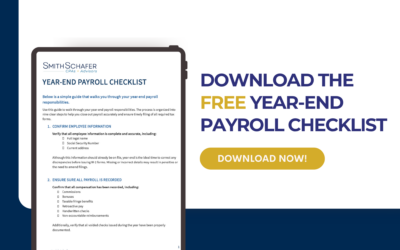Accounting can be complicated and is a crucial component of a firm’s operations, regardless of its size. Many growing professional service firms struggle to create well-tuned accounting processes, especially as systems need to change to support increased activity. Having solid accounting practices in place enables you to make financially sound decisions based on real-time data. This article will walk through eight steps of the accounting process and ensure your professional service firm can scale sustainably.
1. Open a Business Bank Account
Before opening a business account, you must have a registered business name and a Federal Identification number. If your firm is an LLC, Partnership, or Corporation, you must have a separate business bank account. If you are a Sole Proprietorship, you do not need a different account, but we still recommend keeping business income and expenses separate.
2. Itemize Income & Expenses
Effective accounting begins with your business bank account and identifying “cash in and cash out.” Every deposit (cash in) and every withdrawal (cash out) must be categorized to an account. Deposits can be paper deposits or electronic deposits or other credits. Withdrawals can be paper checks, electronic checks, or other debits. Every month, all these transactions will be listed on your bank statement. The first step in accounting is to ensure all the cash coming in and cash going out is correctly recorded in your accounting records in both amount and account. If this is true, then the business has completed a vital step in maintaining clean and accurate accounting records. Technology today has advanced with apps, such as Expensify and Shoeboxed, that have made it easier to track costs and not have to keep hundreds of receipts.
3. Choose a Bookkeeping Method – Cash vs. Accrual
Professional service firms can elect to use one of two bookkeeping methods: cash or accrual. The cash method of accounting is exactly as it sounds – revenue is recorded when cash is received, and expenses are recorded when money is spent. This is the simplest accounting method. However, it does not always give a complete and accurate picture of a firm’s operations. Under the accrual method of accounting, revenue is recognized when it is earned, regardless of when the cash is received, and expenses are accrued even if not yet paid. The accrual accounting method provides a completer and more accurate picture of a firm’s operations and matches the same period’s costs and revenues. We recommend consulting with your accountant on which method is best for your professional service firm.
4. Decide on a Software & Payroll System
A critical business decision is what software you use to track your income and expenses. The most popular product is QuickBooks; there are other options such as Xero or FreshBooks. You will need to evaluate each option as each has its advantages and disadvantages.
5. Identify the Right Payment Gateway
You need a legal and efficient way to collect what you have earned. PayPal, Stripe, and Square are the popular choice for collecting electronic payments. If you receive many checks, you can get check scanners from your bank to make real-time deposits. Also, some programs, like QuickBooks, provide you the opportunity to use their merchant services – therefore, receiving money and paying bills through the Intuit interchange.
6. Understand Tax Obligations for your Type of Business
Taxes are inevitable, and firms need to pay several different kinds of taxes across all government levels: federal, state, and local. The taxes you file will depend on:
- Business’s legal structure
- Whether you have employees or not?
- Is your business subject to sales tax?
Most professional services are nontaxable. However, if your services are taxable, you will need to collect and remit the state department’s appropriate sales tax. If you have employees, you need to make sure to register for a withholding tax account. There are other industry-specific taxes, so work with a CPA to discuss your situation.
7. Regularly Review & Evaluate your Accounting Controls
Like other processes and strategies across your business, you will want to continually review and evaluate your accounting methods. You should always have a controlled procedure for your business accounting because it is a critical aspect of your firm’s success.
8. Consider Working with an Accounting Expert
Business owners typically try to manage it themselves while balancing their many other duties or hire accounting staff to remedy the problem. However, this ties up additional resources and can be ineffective without the proper expertise and day-to-day guidance. We recommend working with an accounting professional or hiring an in-house accountant.
Click to download our infographic: Are you Ready to Outsource your Accounting Department?
Less time worrying about accounting means more time to focus on providing excellent service to your customers. Contact us today to learn about how we can take the burden of accounting off your plate.



